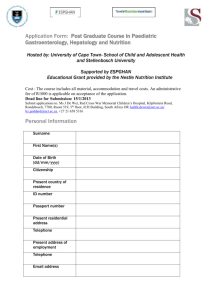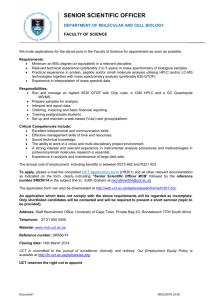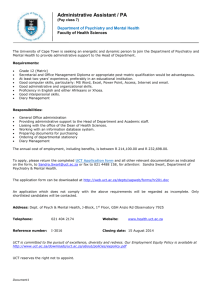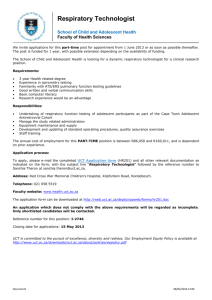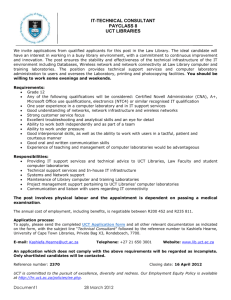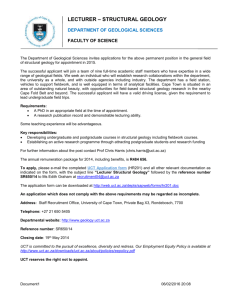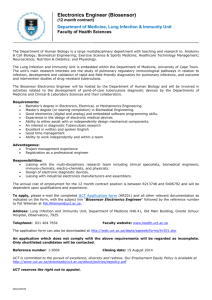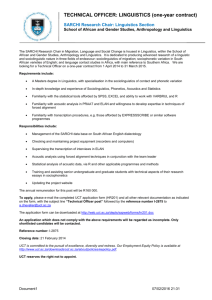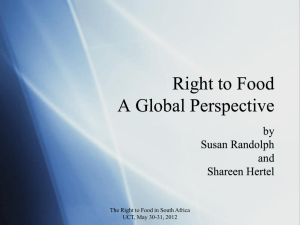here
advertisement
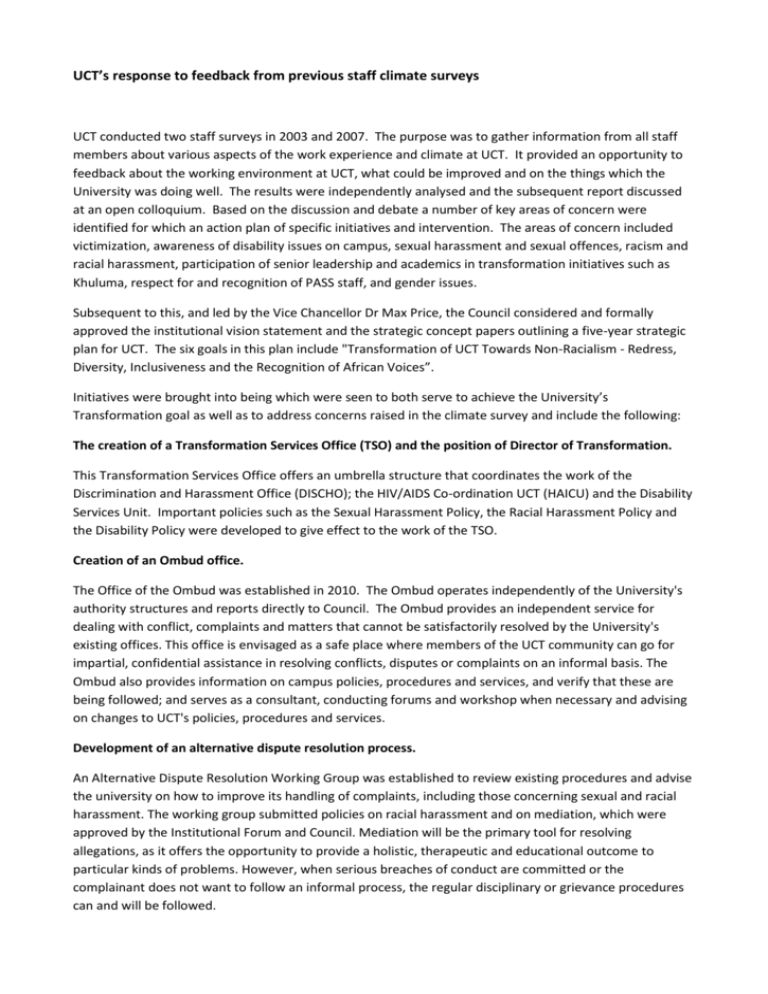
UCT’s response to feedback from previous staff climate surveys UCT conducted two staff surveys in 2003 and 2007. The purpose was to gather information from all staff members about various aspects of the work experience and climate at UCT. It provided an opportunity to feedback about the working environment at UCT, what could be improved and on the things which the University was doing well. The results were independently analysed and the subsequent report discussed at an open colloquium. Based on the discussion and debate a number of key areas of concern were identified for which an action plan of specific initiatives and intervention. The areas of concern included victimization, awareness of disability issues on campus, sexual harassment and sexual offences, racism and racial harassment, participation of senior leadership and academics in transformation initiatives such as Khuluma, respect for and recognition of PASS staff, and gender issues. Subsequent to this, and led by the Vice Chancellor Dr Max Price, the Council considered and formally approved the institutional vision statement and the strategic concept papers outlining a five-year strategic plan for UCT. The six goals in this plan include "Transformation of UCT Towards Non-Racialism - Redress, Diversity, Inclusiveness and the Recognition of African Voices”. Initiatives were brought into being which were seen to both serve to achieve the University’s Transformation goal as well as to address concerns raised in the climate survey and include the following: The creation of a Transformation Services Office (TSO) and the position of Director of Transformation. This Transformation Services Office offers an umbrella structure that coordinates the work of the Discrimination and Harassment Office (DISCHO); the HIV/AIDS Co-ordination UCT (HAICU) and the Disability Services Unit. Important policies such as the Sexual Harassment Policy, the Racial Harassment Policy and the Disability Policy were developed to give effect to the work of the TSO. Creation of an Ombud office. The Office of the Ombud was established in 2010. The Ombud operates independently of the University's authority structures and reports directly to Council. The Ombud provides an independent service for dealing with conflict, complaints and matters that cannot be satisfactorily resolved by the University's existing offices. This office is envisaged as a safe place where members of the UCT community can go for impartial, confidential assistance in resolving conflicts, disputes or complaints on an informal basis. The Ombud also provides information on campus policies, procedures and services, and verify that these are being followed; and serves as a consultant, conducting forums and workshop when necessary and advising on changes to UCT's policies, procedures and services. Development of an alternative dispute resolution process. An Alternative Dispute Resolution Working Group was established to review existing procedures and advise the university on how to improve its handling of complaints, including those concerning sexual and racial harassment. The working group submitted policies on racial harassment and on mediation, which were approved by the Institutional Forum and Council. Mediation will be the primary tool for resolving allegations, as it offers the opportunity to provide a holistic, therapeutic and educational outcome to particular kinds of problems. However, when serious breaches of conduct are committed or the complainant does not want to follow an informal process, the regular disciplinary or grievance procedures can and will be followed. Tackling sexual and racial harassment more effectively. UCT has had policies in place to combat sexual harassment and sexual offences since the 1980s. Following the findings of the last climate survey, these were revised to provide more effective support to those who initiated complaints about sexual harassment. One of the initiatives adopted was the appointment and training of staff members -- academic as well as PASS staff -- as sexual harassment advisors within DISCHO. These volunteers consult and liaise with complainants, alleged perpetrators and those initiating complaints about sexual harassment; provide reports and records to DISCHO on all referred cases; represent the best interests of a complainant or alleged perpetrator in formal communications with DISCHO, where such representation is required; liaise with the case officer in relation to responsibilities that may arise from disciplinary hearings; and support DISCHO's educational work. In a similar vein, a group of antidiscrimination advisors has been trained to play the same kind of role in racial harassment complaints. Strengthening employment equity processes. Creating a more representative demographic profile in the staff and student bodies, enhancing intellectual diversity, transcending the idea of race or gender, improving the university's institutional climate and enhancing the focus of our intellectual enterprise on African perspectives -- these are key elements of UCT's transformation model. To enable a more diverse working environment, UCT has appointed employment equity (EE) representatives in every department. The recruitment and selection policies have been substantially revised to ensure that EE is taken into account throughout the employment selection process, beginning at the earliest stages of recruitment. Broadening student access. Transformation with respect to student access and academic success has been pursued through various strategies. First, the University has committed itself to a massive increase in financial aid at undergraduate and postgraduate levels. Second, it established the admissions review task team, which conducted wide consultations, including those with external stakeholders such as school principals, and will report to Council shortly. Third has been the further strengthening of academic support programmes. These have produced some remarkable success stories. Preparing the 360 degree feedback system. The intention of the project is to develop leadership capacity within the senior and middle management levels of UCT. This is done through a process of 360' evaluation and feedback. Development options for development areas identified through the 360' process include coaching, which is offered through the GSB's Centre for Coaching. This project has rolled out to the Senior Leadership Group (SLG) which has agreed that the evaluation will not run every year, but every two years at the minimum. More recently an offer of 360' coaching for leadership development has been made to all faculties and PASS departments. A number of faculties and PASS departments have indicated that they would like to implement the initiative in their areas according to their particular needs. Recognition of PASS staff In 2011 a revised remuneration and reward system was implemented for PASS staff in Payclasses 1-12. The benchmark for the salaries used to be the 50th percentile of the national all jobs market and in 2011 it changed to linking the salary structures to the 60th percentile of the national all jobs market. In 2012 an 'Exceeds' award system was introduced which rewards excellent performance. Taking stock of Khuluma. The value of Khuluma was the creation of a space for unpacking and delving into the complex terrain of human relationships, particularly in a post-Apartheid South Africa. The first round of Khuluma workshops responded to the UCT staff and student climate surveys of 2003 and 2005, by using the methodology of privilege and ideologies of superiority. These workshops were generally deemed to be a success and generated quite a lot of interest within the University community. They continued until 2010 when interest tailed off. In 2010 a new strategy of an alternative dispute resolution policy for the University was adopted. This involved the development and implementation of the mediation policy, as well as the training of UCT work place mediators (12), which was seen as a critical step in building better relationships on the campus. The need to develop and foster better workplace relations was imperative, in a more holistic and therapeutic context. Building on a programme that was designed for the training of Anti-discrimination Advisors in terms of the Racism & Racial Harassment Policy, the Transformation Services Office embarked on a significant campus-wide initiative called ADAPT, in 2011. This was developed into a post-Khuluma intercultural communication & leadership development programme to encourage bridge-building, understanding and 'human connectedness' at UCT. ADAPT is designed to consolidate and build leadership capacities and inter-cultural competencies in the UCT community, and is intended to create and strengthen an open and inclusive environment at the university. The key focus of ADAPT is not only on what makes us different, but also what makes us the same. The ADAPT Programme focuses on why and how we deal with 'otherness' in those we perceive to be different. In the short to medium term, the most important ADAPT objectives are to: contribute to, and develop the skills, attributes and qualities of those in leadership, managerial and strategic positions at UCT; provide guidelines and support in a way that recognises and supports UCT's mission statement, with particular reference to the 'cultivation of competencies for global citizenship', and striving to 'provide an environment for our diverse student and staff community that is affirming and inclusive of all staff and students and promotes diversity in demographics, skills and backgrounds'; facilitate training and discussions that develop the behavioural and cognitive qualities of leadership (such as openness, empathy, adaptive motivation, perspective taking, behavioural flexibility, and interpersonal communication.
